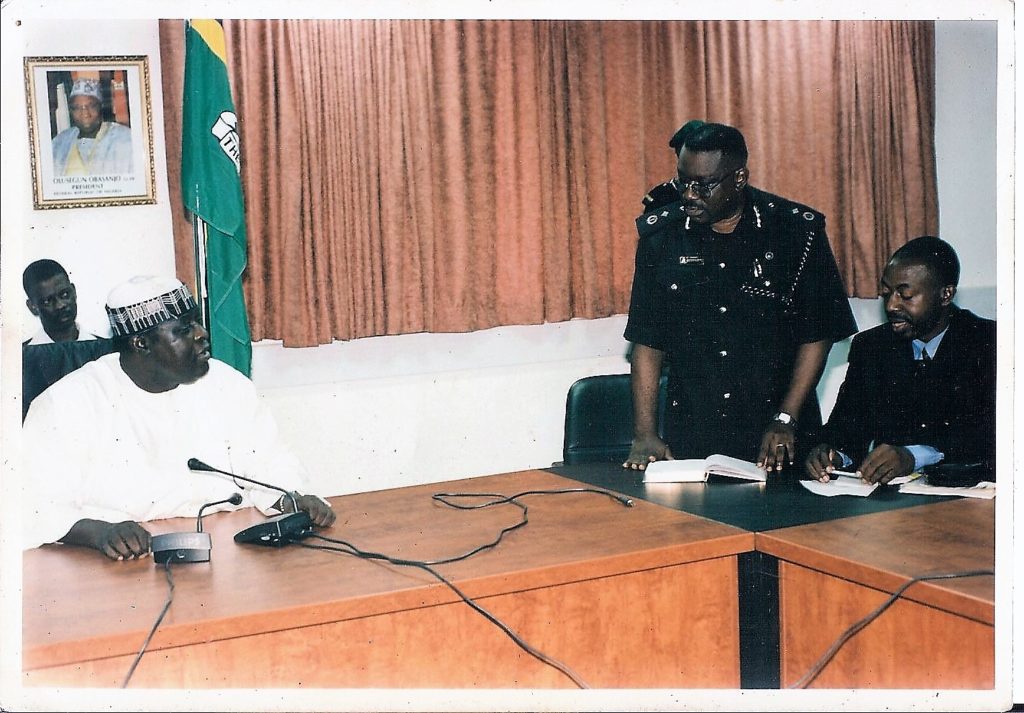Dipo Kehinde
“A man is not dead while his name is still spoken?” says English humourist, satirist, and author, Sir Terry Pratchett OBE in his fantasy novel, Going Postal.
Today, Pratchett’s words speak to the memories of Tafa Balogun, the one-time Inspector General of Police whose footsteps made long-lasting impressions on the Nigeria Police Force.
Balogun, a colossus and pacesetter who took several giant steps as Nigeria’s 11th indigenous IGP, died on August 4, 2022, but thousands of police officers and millions of Nigerians whose lives were touched by his policies will not forget him in a hurry.
On March 6, 2002, Balogun, a fellow of the national war college, who was Assistant Inspector General of Police in charge of Zone 1, Kano, was appointed by President Olusegun Obasanjo as IGP, and he resumed with a smoking gun and a battle cry – ‘Fire for Fire!’ as he set out to reinvigorate the Nigeria Police Force and stem the tide of surging crime wave and insurgency. It was the days of political assassinations, cross-border banditry coordinated by the infamous Republic of Benin-based Hammani Tijani; the era of OPC, MASSOB, and Arewa uprisings.
The Justice Minister and Attorney General of the Federation, Chief Bola Ige, was also assassinated in his bedroom at Bodija Estate in Oyo State, in broad daylight, on December 23, 2001.
Balogun launched an 8-point crime control strategy. Under his command, the police reportedly arrested 19,135 robbery suspects, 6,815 were killed; 12,006 firearms and 472,020 ammunition were recovered, as well as 2,148 stolen vehicles.
Balogun’s 8-point strategy included fast and decisive crisis management, a comprehensive training programme for qualitative policing, an anti-corruption crusade both within and outside the force, robust public relations, community partnership in policing, inter-service/agency cooperation at all levels and improved conditions of service and enhanced welfare package for all officers, inspectors and rank and file.
Balogun’s legacies included the clearing of the backlog and promotion of 170,000 police officers between 2002 and 2004, the highest number since the establishment of the NPF. He sent over 147,347 officers on various courses locally and internationally, created an alternative Mobile Police Training School at Ila Orangun, in Osun State, set up a computer training school for the police in Abeokuta, Ogun State, and ensured regular payment of salaries and allowances.
With the advent of democracy and the need to make the police more humane, Balogun created a female mobile police squad to attend to rioting women.
Balogun also brought an end to the horror at Okija Shrine, a dreaded dispute settlement shrine at Ihiala local government area of Anambra State, Eastern Nigeria, where people with personal, land and business issues go for adjudication by the gods. Balogun physically led his men to the site where several bodies were exhumed.
Balogun was the father of Community Policing in Nigeria. Alongside a five-man delegation from Nigeria, he visited three police departments in Houston, Atlanta, and Chicago in the United States, to understudy proven implementations of community policing and how it could be adapted to the Nigerian situation.
After his visit to the US, he introduced changes in the NPF. In 1999, Nigeria had 130,000 policemen (roughly 1-policeman-per-1000-citizens), but Balogun got Obasanjo’s approval for a 40,000 annual recruitment exercise, and the manpower of the NPF was increased to over 300,000 to inch close to international standards in his time. The United Nations guideline on police to population ratio is one officer to 450 citizens.
After the nationwide EndSARS riot that shook Nigeria in October 2020, Balogun was engaged to pacify striking police officers to return to work.
On December 15, 2020, Balogun also led the flag-off of Community Policing sensitization in Ikeja, Lagos, alongside Oba Riliwanu Akiolu of Lagos.
He said that he was happy to be part of the rebirth of Community Policing, as he reminded the audience of how he introduced the concept as a Philosophy when he became IGP in 2002 and made it one of his 8-point agenda, and how he sent officers to Britain for six months to train as community policing officers, after seeing how it had reduced crimes in some European countries and the United States.

Born on 8th August 1947, at Ila-Orangun in Osun State, South-west Nigeria, Balogun was the first IGP with enviable educational qualifications. He had bagged a BSc Hon in Social Sciences with distinction at the University of Lagos (UNILAG) in June 1971; LLB Hon Second Class Upper, UNILAG, BL, Nigerian Law School, and a master’s degree in strategic studies at the University of Ibadan. He joined the NPF in May 1973 and began his policing career as the Best All-Round Cadet Assistant Superintendent of Police (Course 3). He was awarded IGP’s Sword of Honour by the late IGP Kam Salem on May 11, 1974.
At the War College, Balogun became the first Nigerian officer and the only one ever since to win the Commandant’s Prize. He had also bagged the National Honour of the Commander of the Federal Republic (CFR).
Earlier in his career, Balogun had worked in various positions nationwide. He was the Principal Staff Officer to former IGP Muhammadu Gambo-Jimeta. He was the first-ever Principal Staff Officer to an IGP. He also served as deputy commissioner of police in Edo and commissioner of police in Delta, Rivers, and Abia states.
Balogun retired as IGP in January 2005 and faced a trial after the EFCC commenced an investigation, which was seen in some quarters as politically motivated. He promised to bounce back, and he did on November 21, 2020, when all first-class Igbomina traditional rulers in Kwara and Osun states along with several eminent personalities converged on the ancient town of Ila-Orangun in Osun to confer the traditional chieftaincy title of Oluomo (Star Child) of Igbominaland and award of excellence on him.
Chief Douglas Adeyinka Oyinlola, the Obalotin of Ila, who once spoke about Balogun’s sterling qualities and what he had done to put Ila-Orangun on the world map, said, “Tafa Balogun’s personality is colossal, so is his contributions to developments in Igbominaland. Because of his performances, we gave him the traditional title of Oluomo of Igbominaland.”
Shortly before his death, Balogun’s son – Abayomi married Oluwafeyisayomi, the daughter of Chief Kehinde Fakeye and a granddaughter of the late Minister of Justice – Chief Richard Akinjide, at the Harbour Point marquee, Victoria Island, Lagos.
Eminent personalities at the wedding included Osun State governor, Chief Adegboyega Oyetola, Lagos State governor – Babajide Sanwo-Olu; former FCT Minister, Chief Jumoke Akinjide-Balogun, who represented the Akinjide family; the Ooni of Ife, Oba Adeyeye Enitan Ogunwusi; Oba (Dr) Adedokun Abolarin, the Orangun of Oke-Ila; Oba Sakariyawu Oladimeji, the Orangun of Ika; the Oluwo of Iwo – Oba Abdulrasheed Telu; Oba Fatai Aremu Ojora; the Oniru of Iruland – Oba Abdulwasiu Omogbolahan Lawal; retired Inspectors General of Police Aliyu Attah, M.D. Abubakar, Solomon Arase, former Chief of Defence Staff – Gen. Alexander Ogomudia CFR, Air Vice Marshal (AVM) Femi Sulyman; AVM Sule Lawal; the first female Deputy Inspector General of Police in Nigeria – retired DIG Cecilia Bisi Ugowe; DIG Azubuiko Udah retd; DIG Marvel Akpoyibo Rtd; DIG Oshodi Glover Rtd; DIG Taiwo Lakanu Rtd, and DIG Olufemi Folawiyo who represented IGP Usman Alkali Baba.


The attendance list also included AIG Hilda Harrison Retd; AIG Tunji Alapini Retd; the first Lagos State Commissioner of Police, CP Yemi Odubela Rtd and his wife – DCP Morayo Odubela Rtd; CP Lawrence Alobi Rtd, CP Fatai Owoseni; CP Edward Ajogun; Ogun State CP – Lanre Bankole now AIG; Lagos State CP – Mr Hakeem Odumosu, former MD of Daily Times and Chairman Governing Council of Obafemi Awolowo University – Dr Yemi Ogunbiyi, Professor Adebayo Williams, legal luminary and boardroom guru – Chief Chris Olufunmilola Okunowo; Senator Ganiyu Solomon, Senator Gbenga Mustapha, Chief Ebun Sofunde SAN and wife – Abah; Chief Yinka Kufile, Mrs O.O. Omiyale, Chief Niyi Akande and his wife – Mrs Opetunde Akande; Chief Kola Balogun; Dr Kola Adeyemi, Chairman, All-Souls Hospital; Dr (Mrs) Phillips, Barr Tunji Baale, Dr Reuben Abati, and the Bashorun of Oke-Imesi, Chief Akin Osuntokun.
Balogun died at 74, survived by his wife, Olufunke, and the children.
Dipo Kehinde is a former President of the Crime Reporters Association of Nigeria
0





